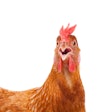Rick Berman, president of Berman and Company, a public relations firm, which among other things runs Humane Watch, gave a presentation at the World Pork Expo that cries out for a response. To set the stage, Humane Watch is an organization dedicated to letting everyone know that the Humane Society of the United States spends almost none of the millions of dollars it raises each year on shelters for dogs and cats. I am aware of the activities of Humane Watch and think that they are providing a public service, but there were some factual errors in Berman’s presentation at the Expo, and I think he reaches the wrong conclusion.
"The [egg] industry shouldn't have lost the ballot initiative in California, but they mounted a stupid campaign against it and got beat," said Berman. He says California is now pushing the national legislation, "but as far as I'm concerned, that's a bad situation that could be made worse. Once you have a national standard, that can be changed. What's to keep HSUS from arguing that the national standard isn't adequate after it's in place? That is the slippery slope the industry is on."
He says fears that other states would adopt similar regulations to California's are unfounded. "There aren't that many states where you can do ballot initiatives, and the legislative approach won't work. HSUS isn't interested in a state-by-state battle, they want the national win."
The facts are that Michigan, Ohio, California, Arizona, Oregon and Washington already have established differing standards for layer housing, and approximately half of the states in the U.S. have ballot initiatives. Berman questions the Humane Society of the United States’ appetite for fighting egg producers on a state by state basis, but that is exactly what they were doing, and they were winning. Egg producers had spent millions of dollars defending against these ballot initiatives and lost.
Berman said that if the Egg Bill is defeated and the California industry is damaged as a result of the ballot initiative, it could hurt the Humane Society of the United States’ reputation. That would expose it as a group that's fighting animal agriculture and endangering the U.S. supply of affordable nutrition.
So, in Berman’s world view, California egg producers are just supposed to take one for the team and go out of business for the long term good of agriculture. Next it would be egg producers in Ohio, or Michigan, or some other ballot initiative state. Egg producers need the national legislation because they can’t make the switch as a group voluntarily, because of the lawsuits resulting from the last time the United Egg Producers reduced cage density as part of a voluntary animal welfare program.
Berman was correct on one point: the Humane Society of the United States is a formidable adversary for all of animal agriculture. Egg producers have negotiated a welfare agreement, the Egg Bill, which provides a transitional period to enriched cages that will give layers a better environment to live in while maintaining efficiency, food safety and avoiding supply disruption for consumers. The Egg Bill maintains a national market for eggs; without this legislation, there is a strong possibility that many egg producers will go out of business just because they are on the wrong side of the state line.
















